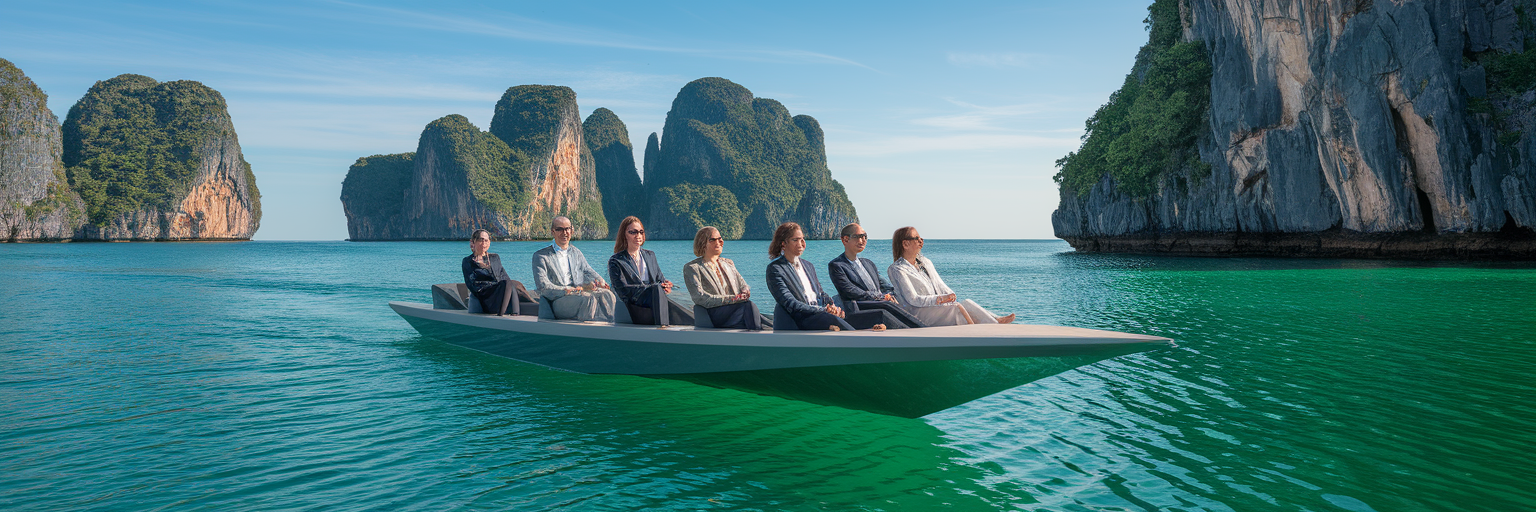Designing Unforgettable Eco Incentives in Thailand
Discover how to create meaningful corporate incentive programs in Thailand by focusing on sustainability and authentic local engagement.

Discover how to create meaningful corporate incentive programs in Thailand by focusing on sustainability and authentic local engagement.

For many American companies, the definition of a premium reward is changing. The corner office view of luxury, once defined by sheer opulence, is giving way to something more meaningful. Today’s top performers increasingly seek purpose driven experiences that align with their personal values. They want to know their reward trip didn't just feel good, but also did good.
This shift presents a unique opportunity, especially during tourism downturns in destinations like Thailand. Quieter periods are not a limitation. Instead, they offer a strategic advantage, granting exclusive access to cultural sites and local communities without the usual crowds. This allows for deeper, more authentic engagement that a standard luxury tour could never replicate. Imagine your team learning from a local artisan in a peaceful workshop, an experience that would be impossible during peak season.
Thailand is uniquely positioned for this new model of sustainable incentive travel Thailand. The nation's commitment to green tourism, reflected in initiatives like its 'Green Tourism Collections,' provides a solid framework. The country’s vision and infrastructure are ready to support high impact, low footprint corporate programs, making it the perfect setting to design a reward that is both memorable and responsible.

Authentic experiences are not found in pre-packaged tours. They are built on genuine connections with the local community. Moving beyond surface level interactions requires a deliberate strategy centered on meaningful partnerships. This approach transforms a corporate trip into a collaborative exchange that benefits both your team and the host destination. As our team has seen firsthand from our Bangkok hub, these connections are the bedrock of an unforgettable incentive program.
Think about the typical corporate gift bag, often filled with items that are quickly forgotten. Now, consider replacing those generic souvenirs with a hands on workshop. Engaging in local artisan partnerships Thailand allows your team to create their own keepsakes, whether it's learning traditional textile weaving in a Northern Thai village or crafting pottery with a master artisan. This experience creates a tangible, personal link to the culture while channeling direct economic support to the craftspeople who preserve these traditions.
The most impactful corporate social responsibility trips are those where participants are active contributors, not just passive observers. Instead of simply visiting a coastal village, your team could participate in a mangrove reforestation project that protects the local ecosystem and livelihoods. Or they could spend a day on a community farm, learning sustainable agricultural techniques from the people who practice them daily. These activities create a sense of shared purpose and leave a positive, measurable impact long after your team departs.
A meal can be more than just a meal. It can be a story of the local landscape. By designing farm to table culinary experiences, you achieve two key goals. First, you significantly reduce the event's carbon footprint by sourcing ingredients from nearby organic farms and fisheries. Second, you offer guests an authentic taste of Thailand’s rich regional cuisines, prepared with fresh, seasonal produce. It’s a sensory journey that connects your team directly to the local land and its flavors.
A truly sustainable event considers its environmental impact at every stage. The logistical choices you make, from transportation to accommodation, are just as important as the activities you plan. Designing eco friendly corporate events requires a comprehensive approach that integrates sustainability into the core of your operational plan. This level of detail is central to the event management services we provide, ensuring every element aligns with your company's ESG goals.
Thailand's national push for clean energy has made green transportation more accessible than ever. Instead of standard diesel coaches, consider using a fleet of electric vans for airport transfers or quiet, modern electric tuk-tuks for exploring cities like Bangkok and Chiang Mai. These choices not only reduce emissions but also send a clear message about your company's commitment to sustainability from the moment your team arrives.
Choosing the right venue is a critical decision. Opting for hotels and event spaces with recognized green certifications ensures your program meets high standards of environmental stewardship. These certifications are not just labels. They signify that a venue has implemented robust systems for waste management, water conservation, and energy efficiency. As insights on green event trends in Asia-Pacific highlight, the demand for venues with verifiable sustainability credentials is on the rise, making this a key consideration for forward thinking planners.
Thoughtful itinerary design can dramatically lower your event's carbon footprint. Planning a trip that focuses on a single region, for example, can eliminate the need for carbon intensive domestic flights. You can also incorporate activities that are inherently sustainable and offer unique perspectives, such as guided cycling tours through rural landscapes or kayaking expeditions along coastal waterways. These activities immerse your team in the natural beauty of Thailand while keeping your environmental impact to a minimum.
| Transport Mode | Relative Carbon Footprint | Attendee Experience | Best Use Case |
|---|---|---|---|
| Domestic Flight | High | Fast for long distances, but disconnected from scenery | Connecting distant regions (e.g., Bangkok to Phuket) when time is critical |
| Private Diesel Coach | Medium-High | Comfortable for large groups, standard experience | Inter-city transfers where EV options are unavailable |
| Electric Van / Shuttle | Low | Quiet, modern, and comfortable; signals a commitment to sustainability | Airport transfers, short to medium-distance group travel |
| Electric Tuk-Tuk | Very Low | Fun, immersive, and authentic city exploration | Short-distance transfers and guided city tours in urban areas like Bangkok |
| Skytrain / MRT (Bangkok) | Very Low | Efficient, avoids traffic, offers a local perspective | Individual or small group movements within Bangkok's city center |
This table provides a comparative overview of common transport options for corporate events in Thailand, evaluated based on their environmental impact and the quality of the attendee experience.

Modern sustainability is powered by smart technology. Integrating digital tools into your incentive program not only reduces its environmental footprint but also creates a more seamless and engaging experience for attendees. This approach aligns with the emphasis on digital transformation within the Thailand MICE sustainability framework, ensuring your event is both responsible and cutting edge.
The days of printing stacks of paper itineraries, maps, and welcome packets are over. A dedicated event app consolidates all necessary information into a single, accessible digital hub. This simple switch eliminates significant paper waste while providing attendees with real time updates, interactive maps, and instant communication channels. It’s a solution that is both greener and more efficient, and as we've explored before, digital platforms can be used to create meaningful engagement.
Technology can also make the planning process itself more sustainable. Instead of multiple international flights for site inspections, planners can use high-definition virtual tours to evaluate venues and locations remotely. You can also implement virtual cultural briefings for attendees before they travel, building anticipation and preparing them for the experience ahead. These hybrid elements reduce the carbon footprint associated with preliminary travel without sacrificing quality or preparedness.
For a US corporate audience, demonstrating tangible results is essential. Digital tools allow you to move beyond anecdotal evidence and quantify your event's positive impact. You can use software to calculate the carbon footprint reduction achieved through green transportation choices or track the precise economic value directed to local communities and artisans. This data provides concrete metrics for your company’s sustainability reports, turning your incentive trip into a powerful case study of corporate responsibility in action.
The conversation around responsible travel has evolved. The old mantra of "leave no trace" is being replaced by a more ambitious and inspiring goal: to leave a better place. The ultimate measure of a modern incentive program is not just the memories it creates for your team, but the net positive contribution it makes to the host destination. This philosophy is at the heart of designing truly unique corporate retreats Thailand.
This approach directly enhances corporate brand value. A well executed sustainable incentive trip becomes a compelling narrative that you can share with customers, investors, and future talent. It demonstrates a commitment to global citizenship that resonates deeply in today's market, fostering profound employee loyalty and strengthening your brand's reputation. It shows your company invests in its people and the planet.
By blending authentic cultural immersion, direct community support, and measurable environmental stewardship, companies can set a new standard for corporate travel. Thailand’s approach serves as a powerful blueprint for the future of incentive programs across the Asia Pacific region. By adopting this forward thinking model, companies can redefine what corporate travel means and create experiences that resonate on every level.